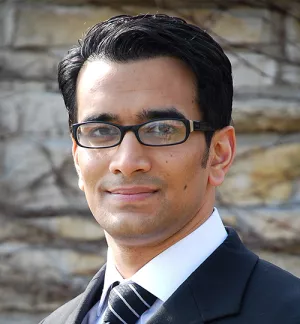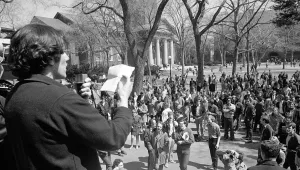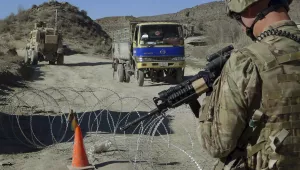All across Afghanistan today, village elders have been advising villagers on how to solve their day-to-day problems and trying to chart a course for their village as best they can. It has been like this every day, for centuries. Some may also know that their country is about to become the foreign policy priority of the newly elected president of the world’s superpower. Obama plans to send 31,000 troops there, in an effort to secure the country.
As the deployment in Afghanistan enters its eighth year, it is worth reminding ourselves why we are there. The mission has four aims. Firstly, to reduce the insurgency until it is no longer a significant threat to progress. Secondly, to make sure that core Al-Qa’ida does not come back. Thirdly, to make sure that Afghanistan remains a legitimate state. And lastly, to make sure that Afghanistan can handle its own security.
I believe that we can still fulfil those aims, but sending more troops alone will not do it. There are three reasons for this. They relate to the nature of the opposition, the situation on the ground, and the number of troops we would need.
Many in the British and American foreign policy establishments see their aim as keeping the Taleban out of Afghanistan. This is a dangerous misunderstanding. Most Taleban are ordinary Afghans. (Although most ordinary Afghans are not Taleban). They tend to be motivated by varying combinations of money, Islamism, and a nationalist desire to free their country of foreigners. Reporter Jason Burke has described how when he asks village locals who the Taleban are, a common response is bemused surprise and the answer “men from my village.”
As Burke argues, this has three important implications. Firstly it means that villages and elders across Afghanistan often relate more easily to the Taleban’s religious conservatism, Koranic literalism, and rural and nationalistic folklore better than to human rights, democracy, and gender equality. Secondly, it means that when the Taleban prepare for military advances by sending clerics into local villages to solve disputes, many village elders are happy to have an alternative to slow and corrupt government courts. This is particularly true since many clerics have become more tolerant of music, kites, shorter beards and the like since their days in government. Thirdly, it means that when the village elder is deciding whether he should offer his and his village’s allegiance to the Taleban or the allies, his choice is often between foreigners who might fix the village’s water or electricity at some point in the future but in practice often cannot guarantee security, or Taleban — perhaps familiar faces — who offer them security and a familiar, if rough, form of justice.
The second reason why increasing troop numbers will not be enough to fulfil our war aims is that the situation on the ground is not in our favour. The Taleban has retaken a significant proportion of the country (even if it is less than it claims). Taleban attacks and U.S casualties were the highest in 2008 since the war began in 2001. The government is regarded within Afghanistan as both weak and beholden to its western allies. Well-intentioned development projects have not been as big an inducement to support the government as was hoped. And 70% of allied supplies enter the country through two supply crossings — Torkham and Chaman on the Afghanistan-Pakistan border — one of which has recently had to shut for a while due to increasing attacks. No other significant alternative supply routes into the country have been found. A British military commander has said publicly that the war as currently conceived cannot be won.
The third reason is the number of troops which we would need to fulfil our aims. There are currently 48,000 NATO troops in the country. Obama’s deployment would take that number to 77,000. The Soviet Union failed to pacify the country with 130,000 troops, a border with Afghanistan, and looser rules of engagement. A departing NATO commander, General McNeill, said that the task would take 400,000 troops. Britain has urged other allies to send more, but popular support for the war in most NATO countries is currently low and falling. Neither imperial Britain nor Alexander the Great was able to pacify Afghanistan, a massive, mountainous and rugged country. Most analysts agree that it will not be achieved by more troops alone.
Until now, the option of negotiation or power-sharing with moderate elements of the Taleban has not been on the table because of the assumption that the Taleban were monolithically committed to violence. That can no longer be assumed. In November 2006, one of its leading supporters in Pakistan, Maulana Fazlur Rahman, stated publicly that the Taleban could stand as a party in Afghan elections as his Islamist party had recently done in Pakistan. Some Taleban members have argued that the Afghan state’s army and police should be strengthened in order to persuade allied forces to leave sooner. Some officials in the Afghan government have said that they were approached by Taleban leaders seeking to negotiate in 2004. And there have been reports of negotiations in Saudi Arabia between Taleban representatives and the Afghan government.
It can also no longer be assumed that the Taleban are committed to al Qaeda. They remain two distinct organisational entities divided by language. There are no Afghans at the top of al Qaeda and no Arabs at the top of the Taleban. And two Taliban spokespeople have talked publicly about divergence between the two groups.
The bottom line is that our war aims can still be achieved, but not by force alone. Lasting stability in Afghanistan will only be achieved by negotiating with moderate elements in the Taleban and opening the way for them to share power. That will bolster the legitimacy of national government in Afghanistan, and ultimately divide and weaken the insurgents. Troops will be necessary to reduce the insurgency. But this should be seen as a means to the end of ending the conflict by enabling us to negotiate from a position of relative strength. Only a power-sharing government which includes the least extreme elements of the Taleban will be able to achieve the other three war aims — ensuring that Afghanistan remains a legitimate state, ensuring that it can handle its own security, and keeping core al Qaeda out of the country.
The current government is committed to a stable, secure and democratic Afghanistan, but we have to start looking at the country long term. We will not be able to secure the Karzai government after we leave. The only way to ensure that the next government commits to these objectives is to engage moderate Taleban in a power-sharing government now.
Azeem Ibrahim is a Research Fellow at the International Security Program, Kennedy School of Government at Harvard University and a Member of the Dean’s International Council, Harris School of Public Policy and Diplomacy at the University of Chicago.
Ibrahim, Azeem. “Obama's 'Troops in' Movement Will Not Force the Taleban Out.” The Scotsman, January 21, 2009





